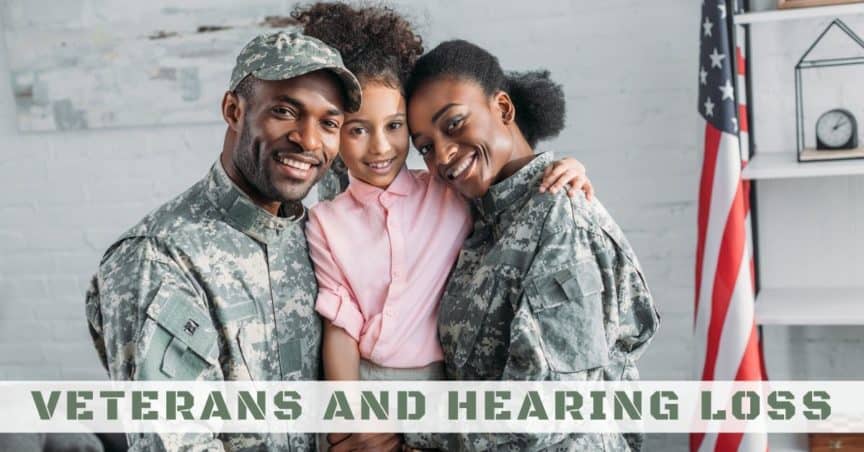- Occupational Hearing Hazards - April 27, 2020
- Understanding Noise-Induced Hearing Loss - April 18, 2020
- Understanding Noise-Induced Hearing Loss - April 12, 2020
If you or a loved one has served our government’s military there is a high chance that you deal with some level of hearing loss. According to the U.S. Department of Veterans Affairs, more than 2.7 million veterans currently receive disability benefits for hearing loss or tinnitus, a ringing in the ears. Veterans are 30 percent more likely than non veterans to have severe hearing impairment, according to a Centers for Disease Control and Prevention analysis. Those who served after September 2001 are four times more likely and their numbers are growing
Noise-induced hearing loss
Noise-induced hearing loss is a significant impairment in the military and can affect combat performance. Military personnel are constantly exposed to high levels of noise and it is not surprising that noise induced hearing loss and tinnitus remain the second most prevalent service-connected disabilities. Most of the hearing loss and tinnitus in the military is often a result from gunfire, aircraft, tanks, heavy equipment and roadside bombs. Normal age-related hearing loss can make the problem more severe.
This can have a devastating long-term impact. Veterans with tinnitus may hear a ringing, hissing or buzzing that keeps them from being able to concentrate or sleep. Hearing loss, meanwhile, may make it difficult for someone to maintain relationships with friends and family members, leading to depression, social isolation and eventual cognitive decline.
The importance of hearing protection
The good news is that hearing loss is often preventable. Hearing protection is now standard issue and mandatory for all active-duty service members. Proper fitting and consistent wearing of hearing protective devices help prevent hearing loss and tinnitus. Noise-induced hearing loss and tinnitus are the top two health conditions among military veterans. In 2016, Veterans Affairs had 1,610,911 compensation receipts for tinnitus and 1,084,069 for hearing loss. Additionally, many Veterans who score normally on hearing tests have trouble understanding speech. This condition, called auditory processing disorder, is associated with blast exposure.
All about hearing protection
It is essential for everyone to take care of their ears and hearing, as damage to the auditory system could be irreparable. However, if you have hearing loss it is especially important to preserve and protect your remaining hearing as communicating freely with others is vital. Below are popular options to protect your ears.
- Earplugs: Earplugs are a convenient, low-cost tool for hearing preservation. Traditional earplugs effectively prevent hazardous noise from entering the ear canal, but they can interfere with communication requirements in training and in the field, such as being able to hear speech or combat sounds. Level-dependent earplugs do exist, using a filter that enables soft noises to be conveyed at full strength yet eliminate high frequency or impulse noise.
- Earmuffs: Earmuffs block sound by creating an airtight barrier externally around the entire ear, and are best used for intermittent exposure to noise. Earmuffs provide great protection, and more durability than earplugs. Although they block softer sounds including speech, some military-grade earmuffs contain an electronic communication system to allow for clear communication.
- Noise-Attenuating Helmets: Noise attenuating helmets protect the wearer from hearing loss, crash impact, and eye injuries. Helmets can also improve communication through use of a radio communication piece. Technologically advanced helmets include active noise-reducing systems that monitor the sound energy around the ears and cancel any unwanted noise while preserving verbal communication. Communication earplugs serve as microphones and can be worn in addition to the helmet for high-quality verbal clarity.
- Suppressors: In 2017 the U.S. Marines began using suppressors on service weapons. Some have called it the “stealth technology” for infantry. Suppressors offer numerous advantages in a firefight. They can help troops avoid hearing loss and the lifelong effects of hearing damage. While they don’t completely drown out gunfire, they can reduce noise by more than 30 decibels.
Palm Beach Hearing Associates
If you have served in the military and you feel like your hearing has been compromised, hearing aids are usually the most effective treatment to help with your hearing loss and/or tinnitus. Contact us at Palm Beach Hearing Associates to set up an appointment to get your hearing tested. We can help you find the best hearing aids for your hearing needs and lifestyle. Contact us today and don’t let your hearing problems hold you back from the life you fought so hard for.

